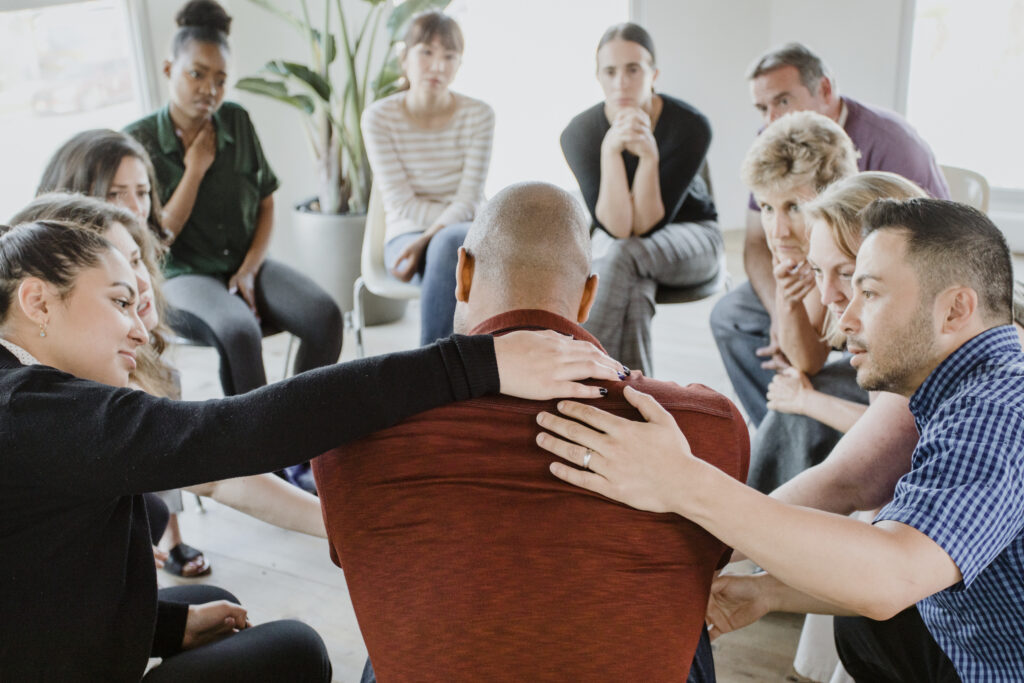
The journey of recovery is not just about healing from an ailment or addiction; it’s a profound exploration of self, a redefinition of purpose, and a rekindling of passion. This article delves into the multifaceted process of finding meaning in recovery, shedding light on the importance of compassion, service, positive psychology, and personalization in the healing journey. It draws inspiration from personal stories, the impact of communities like SHE RECOVERS, and the transformative power of service and connection to foster a deeper understanding of recovery.

In the journey of recovery, self-compassion is a beacon of hope, guiding us through the inevitable setbacks. It’s about treating ourselves with the same kindness and understanding that we would offer a good friend. Recognizing that the road is not linear, we learn to appreciate our efforts and forgive our stumbles.
Self-compassion involves more than just being kind to ourselves; it’s about being honest and realistic about our capabilities and limitations. It’s about distinguishing between being gentle with oneself and falling into the traps of laziness or self-sabotage. Here are some steps to foster self-compassion:
By reframing painful narratives and introducing lightness into our lives, we can move forward after hardship with a compassionate heart. Laughter and insight become tools for healing, as we connect past traumas to our present journey, gaining wisdom along the way.
Ultimately, self-compassion is about embracing our humanity, with all its flaws and strengths. It’s about being our own ally in the face of challenges, and recognizing that each step forward, no matter how small, is a victory in the path to recovery.

Recovery is a journey, and like any journey, it should be filled with moments of joy, laughter, and camaraderie. It’s essential to remember that recovery is not just a path out of addiction, but also a road to rediscovering the lighter side of life. Incorporating humor and lightness can significantly ease the emotional burdens of recovery, providing a much-needed respite from the more challenging aspects of the healing process.
Laughter is not just a momentary escape; it’s a powerful tool that can transform the atmosphere of recovery, making it more approachable and less daunting. Here are a few ways to bring humor into your recovery journey:
Embracing the absurd and surprising moments in life can lighten the load of recovery. It’s about finding balance, allowing yourself to experience joy amidst the work of healing.
Remember, every individual’s recovery is unique, and what brings laughter to one person may differ for another. The key is to stay open to experiences that bring joy and to share those moments with others in the recovery community.

Healing from trauma is not a linear process; it involves acknowledging the pain of the past while simultaneously nurturing the present self. Understanding the interconnectedness of past experiences and current behaviors is crucial in the journey towards healing. It’s about creating a new narrative that includes both the wounds and the wisdom gained.
Patience is a virtue that cannot be overstressed in this process. As highlighted by HelpGuide.org, being patient with the pace of recovery is essential, as everyone’s response to trauma is different. This understanding can foster a compassionate approach to self-healing.
The path to healing is often paved with small, consistent steps rather than giant leaps. Embracing each step with kindness and resilience can transform suffering into a source of strength.

Volunteering during the recovery process offers more than just a way to pass the time; it is a profound step towards rebuilding a life with purpose and joy. Engaging in volunteer work can be a transformative experience, providing individuals with a sense of community and the opportunity to give back in a meaningful way.
Volunteerism can play a crucial role in the healing journey, as it allows for the development of new skills and the strengthening of social networks. By focusing on the well-being of others, those in recovery can find a powerful pathway to their own wellness.
Volunteering is not just an act of service; it is a commitment to one’s own growth and recovery.
The SHE RECOVERS Foundation exemplifies the impact of volunteerism, with volunteers expressing how their roles support the sustainability of a movement that is deeply important to them. They contribute to creating inclusive, compassionate spaces that are essential for healing and connection.

In the landscape of recovery, Connection is Critical for Recovery. It’s the web of relationships that sustains individuals through the ups and downs of healing. Embrace the support around you, whether it’s from family, friends, counselors, or support groups. These connections can provide the strength and encouragement you need to continue, especially during challenging times.
Recovery is not something you have to do alone; there’s a community waiting to hold you up, share your burdens, and celebrate your victories, no matter how small they may seem.
By leveraging technology, such as apps for mindfulness and gratitude journaling, and accessing virtual support groups and online counseling, individuals can find continuous emotional support. This bridges the gap between physical recovery and mental health, ensuring a supportive recovery environment.

In the realm of recovery, gratitude and mindfulness stand out as powerful tools that can transform the journey towards healing. By focusing on the present and acknowledging the good in one’s life, individuals can shift their perspective from one of scarcity to one of abundance.
Leveraging technology, such as apps for mindfulness and gratitude journaling, provides a practical way to integrate these practices into daily routines. Virtual support groups and online counseling further support this integration, offering continuous emotional support and bridging the gap between physical recovery and mental health.
Embracing gratitude and mindfulness is not just about adding new habits; it’s about cultivating a new way of seeing and being in the world. It’s about saying goodbye to limitations and welcoming a life filled with new possibilities.

Strengths-based counseling is a cornerstone of positive psychology that focuses on an individual’s inherent talents and abilities as a pathway to healing. By recognizing and harnessing these strengths, individuals in recovery can foster a sense of competence and optimism that is crucial for sustained progress.
The process of strengths-based counseling involves several key steps:
Embracing one’s strengths can lead to a profound shift in self-perception, from focusing on deficits to celebrating capabilities. This approach not only enhances self-esteem but also empowers individuals to take charge of their recovery journey.
Customization of counseling strategies is essential, as each person’s recovery path is as unique as their personal background and circumstances. A strengths-based approach is not a one-size-fits-all solution; it requires a deep understanding of the individual’s life story and aspirations. The ultimate goal is to create a personalized recovery plan that resonates with the individual’s sense of purpose and facilitates a transformative healing experience.

In the realm of recovery, the creation of supportive environments is paramount. Collaborating with other treatment programs allows for a more holistic approach to patient care, addressing not just substance abuse but also mental health issues and physical health needs. This synergy between different facets of healthcare is essential for a comprehensive strategy that fosters both physical healing and psychological well-being.
In-depth support is a cornerstone of effective addiction counseling, which goes beyond mere advice to abstain. It encompasses a variety of strategies, including:
There is a transformative power in compassionate support and evidence-based strategies in overcoming addiction. Meeting individuals where they are, without judgment, and tailoring the recovery plan to their specific needs is crucial.
The integration of virtual support groups and online counseling bridges the gap between physical recovery and mental health, offering continuous emotional support. By focusing on building psychological skills, the recovery process is not only aided but also enriched, leading to a more sustainable return to everyday life.

Recovery is a deeply personal journey, and what works for one person may not work for another. It’s important to remember that identifying and managing triggers is an ongoing process, one that requires patience, resilience, and support. Whether you’re in the early stages of recovery or further along on your path, know that you’re not alone.
Recovery occurs via many pathways: Individuals are unique with distinct needs, strengths, preferences, goals, culture, and backgrounds — including trauma.
In the early stages of recovery, your journey takes on a fragile state, akin to driving a vehicle that’s just come out of an intensive repair shop. The systems are reset, the engine is clean, but the memory of those old, hazardous routes—those triggers—remains imprinted in the GPS. These triggers, much like potholes and treacherous turns on a road, can threaten the stability of your recovery, tempting you back onto the perilous paths you’ve worked so hard to leave behind.

Understanding the unique nature of recovery is essential, as each individual’s journey is distinct. Managing triggers is a critical aspect of building resilience and support in the recovery process. Triggers are specific stimuli that evoke memories or sensations associated with substance use or addictive behaviors, potentially leading to cravings or relapse. Recognizing and managing these triggers is a cornerstone of successful, long-term recovery.
Keeping a trigger journal is a practical strategy for tracking triggers and responses. This can include noting the circumstances, emotions, and outcomes associated with each trigger. By doing so, individuals can begin to identify patterns and develop strategies for avoiding or coping with these triggers.
Recognizing and addressing internal triggers is a complex but essential component of addiction recovery. It requires individuals to develop a deep understanding of their emotional states, physical sensations, and thought patterns.
By employing these strategies, individuals can navigate their recovery with greater confidence and support, reducing the risk of relapse and fostering long-term wellness.

As we delve into the complexities of recovery, it becomes evident that there is no one-size-fits-all definition. Recovery is a deeply personal journey, shaped by individual experiences, cultural backgrounds, and societal expectations. The Substance Abuse and Mental Health Services Administration (SAMHSA) has sparked discussions with its reports, suggesting that the concept of recovery is continually transforming.
Recovery outcomes are influenced by a myriad of factors, including the availability of in-depth support and the role of positive psychology. A holistic approach that incorporates mental, emotional, and physical healing is crucial for a sustainable recovery path. This approach is not static; it evolves with our understanding of addiction and the diverse needs of those in recovery.
Recovery is not a destination but a lifelong journey of healing and growth. It is a reminder that recovery differs across populations, cultures, and settings, and that each path is as unique as the individual walking it.
As we journey through the landscape of recovery, we uncover the profound truth that our path is uniquely our own, yet deeply connected to the collective experience of healing. Recovery is not a destination but a lifelong voyage of self-discovery, compassion, and growth. Whether we find solace in gratitude journaling, the pursuit of meaningful work, or the connections forged in online gatherings, each step we take is a testament to our resilience. Let us hold onto the notion that recovery is redefining itself every day, as we do, and that in this dynamic process, we find our purpose, passion, and the power of connection. Together, we answer the call to heal, to grow, and to thrive, embracing the ever-evolving definition of recovery that honors our individuality and our unity.
Self-compassion provides a kind and understanding approach towards oneself during setbacks in recovery. It fosters resilience, allowing individuals to acknowledge their struggles without harsh judgment, encouraging them to persevere and continue their journey.
Humor adds lightness to the recovery journey, helping individuals to not take setbacks too seriously. It allows for moments of joy and laughter, which can alleviate stress and provide a more balanced perspective on the challenges faced.
Volunteering offers a sense of purpose and fulfillment by giving back to others. It can enhance personal growth, create meaningful connections, and strengthen your recovery community, all of which are crucial elements in sustaining recovery.
Gratitude and mindfulness are tools that promote a positive outlook and stress management. They help individuals stay present, appreciate the good in their lives, and develop a positive mindset that supports the healing process.
Recovery is a deeply personal journey, and a one-size-fits-all approach does not work for everyone. A personalized approach respects individual differences, cultural backgrounds, and unique triggers, ensuring a more effective and respectful recovery process.
